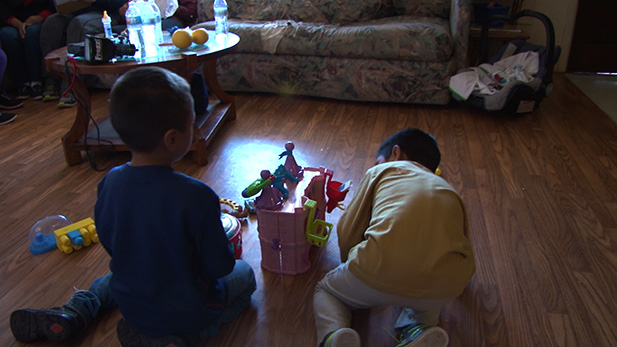
Listen:
A new wave of migrants from Central America is crossing the border into the U.S. illegally, the Border Patrol has reported.
The number being caught at or near the border has more than doubled since last fall, the Department of Homeland Security reported.
That comes nearly two years after a surge of mostly unaccompanied minors and women with small children fleeing violence in their countries caused a humanitarian crisis in Arizona and Texas.
There was chaos at the Tucson Greyhound bus depot as border agents dropped off families after processing them and setting court dates.
To avoid a repeat, non-profit organizations and volunteers are working with border officials in Tucson, providing temporary help until the Central Americans can take buses to be with relatives already living in the U.S.
A rare look inside Tucson's Casa Alitas, a safe house for Central Americans seeking refugee status, shows the sights and sounds of a day care filled with young children doing what kids do best.
“They want to play," volunteer David Buss said. "They are a little shy at first, but it doesn’t take them long to get over that . Then they’re out playing!”
Buss is a volunteer at Casa Alitas – alitas is Spanish for wings. As he watched the kids play, he looked over at their mothers.
"The first thing that popped into my mind was resilience," Buss said. " I’ve heard some of their stories. The journey is long and difficult and I know they come from a terrible dangerous and fearful situation and they fled. They are resourceful. They come through with their kids with incredible courage.”
Volunteers like David Buss said regardless of one's stance on U.S. immigration laws, the fact remains that these mothers have embarked on a treacherous journey with young children in tow, out of fear.
Most of them are from Guatemala where two major gangs rule. UNICEF says Guatemala is one of the most perilous places for a child to grow up. And the Guatemalan Justice Ministries reports a 600 percent increase in gang violence from 2014 and 2015.
Marta is 41 years old. She said her husband was murdered by gang members.
Her oldest daughter has already made her way to the U.S. and established legal status. The plan is for Marta to join her. She sold all their belongings, and in the middle of the night, packed up her second daughter, a teenager and 5-year-old grand son and headed north.
Twenty days and 2,000 miles later, she turned herself and her family into U.S. border officials to seek asylum.
Marta said she doesn’t want to break any laws, but she fears for the safety of her youngest daughter and grandson. Her then 12-year-old daughter was raped twice by gang members, she said, and her grandson, 5, was already being recruited by the gangs.
Marta was granted conditional entrance to the U.S., but no guarantee that she can stay. She will in all likelihood eventually be deported.
That is the case for most who, after a long wait, get a hearing on asylum petitions.The Department of Homeland Security reports 80 percent are turned down and ordered deported.
But for now, Marta has made it to a safe house in Tucson that will help her get to her daughter’s home in Boston.
Jaime Lynn oversees Casa Alitas for Catholic Community Services.
“We work with ICE (Immigration and Customs Enforcement) and they will contact us or Border Patrol will contact us when they have families to release,” Lynn said.
Lynn said the families keep coming. Two years ago, those granted temporary asylum were dropped off at the Tucson Greyhound Bus Depot stations to make their own way.
Now there is Casa Alitas and volunteers to help. Here the families can take a shower, get clean clothes and a meal. Then volunteers help them purchase bus tickets with money sent by relatives to get them to their final destinations.
“Some people might say that they don’t deserve it", Flynn said. "But really the families are not coming here because they think America looks nice or maybe it would be more fun to live here. They don’t want to leave their countries, but they have to for some really horrible reasons."
After decades of corruption and violence, there may be hope for Guatemala. A new president has just been elected who promises reforms and a crackdown on the gangs.
Those same promises have been made and broken by every elected president for decades, leading to the ongoing surge of families fleeing north to safety.

By submitting your comments, you hereby give AZPM the right to post your comments and potentially use them in any other form of media operated by this institution.